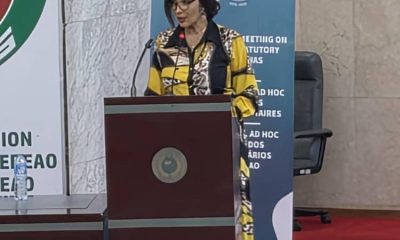OPINION
Importance Of Ensuring That Education Loan Is Disbursed With Integrity, Fairness, And Transparency

BY ISAAC ASABOR*
There is no denying that the federal government’s recent implementation of an education loan program represents a significant shift in the country’s approach to financing higher education. For many, this initiative has elicited a mix of optimism and scepticism. While the prospect of easily accessible education loans is encouraging, it raises serious concerns about the government’s commitment to integrity, fairness, and transparency in managing these funds.
Without a doubt, education is frequently regarded as the foundation of national development; however, access to quality higher education in Nigeria has long been a privilege reserved for the few who can afford it. It is no surprise that the introduction of an education loan scheme aimed at bridging this gap sparked excitement among many Nigerians. This is because it aims to provide students from a variety of socioeconomic backgrounds with the opportunity to pursue their academic goals. This initiative is especially timely given the rising cost of tuition, which has placed a significant burden on many Nigerian families.
As stated clearly in several statements issued thus far by the government through its public engagement representatives, the loan scheme is intended to ensure that no qualified student is denied the opportunity to further his or her education due to financial constraints. By providing financial assistance to students who would otherwise struggle to pay tuition, the government appears to be making a commendable effort to democratise access to higher education. However, the success of this initiative is dependent on the principles of integrity, fairness, and transparency in its implementation.
Given the foregoing points of view, it is reasonable to conclude that for the education loan scheme to achieve its intended goals, the government must maintain unwavering integrity in its administration. This includes ensuring that loan beneficiaries are selected on merit, without corruption or nepotism. There have been previous concerns about financial mismanagement in various government initiatives, and this education loan must avoid similar pitfalls.
In this context, integrity implies that the government must remain committed to the loan scheme’s long-term viability. This includes developing clear and realistic repayment plans that do not place a burden on graduates who are just starting their careers. The government must also ensure that the funds allocated for the scheme are only used for their intended purpose, with strict oversight mechanisms in place to prevent any form of diversion or embezzlement.
Fairness is another important factor that will determine the success of the education loan scheme. The application and selection processes must be transparent and open to all eligible students, regardless of socioeconomic status, ethnicity, or region. There should be no room for favouritism or bias, and each applicant should have an equal chance to benefit from the scheme.
Furthermore, the eligibility criteria must be clearly defined and justifiable. The government must establish reasonable benchmarks to ensure that only those who truly need financial assistance receive loans while avoiding overly stringent requirements that may exclude deserving candidates. Fairness also extends to repayment terms, which should be structured in a way that takes into account the current economic realities facing Nigerian graduates.
Transparency is perhaps the most important factor in increasing public trust in the education loan scheme. The government must be transparent about all aspects of the program, from the total amount of funds available to how loans are disbursed and managed. Regular audits should be conducted and the results made public to ensure accountability at all stages.
Furthermore, the loan application and approval process should be simple and easy to follow. The government must provide specific information about how students can apply, what documents are required, and how long the process will take. There should be no hidden or unexpected fees, and applicants should be kept updated on the status of their applications throughout the process.
While the introduction of an education loan scheme in Nigeria is a commendable step towards increasing access to higher education, the government must maintain the highest levels of integrity, fairness, and transparency throughout its administration. The success of this initiative is determined not only by the availability of funds but also by the trust that Nigerians have in the system.
As stakeholders in the education sector, including students, parents, and educational institutions, we must remain vigilant and hold the government accountable for the promises made. By doing so, we can ensure that the education loan scheme serves its intended purpose of empowering Nigerian students and contributing to the country’s development.
Given the foregoing, it is reasonable to conclude that the government now has the opportunity to demonstrate its integrity, fairness, and transparency in its dealings. For the sake of Nigeria’s future, we hope the government and its representatives who will disburse this loan rise to the occasion.
-
CRIME4 years ago
PSC Dismisses DCP Abba Kyari, To Be Prosecuted Over Alleged $1.1m Fraud
-
FEATURED4 years ago
2022 Will Brighten Possibility Of Osinbajo Presidency, Says TPP
-
FEATURED2 years ago
Buhari’s Ministers, CEOs Should Be Held Accountable Along With Emefiele, Says Timi Frank
-
BUSINESS & ECONOMY2 years ago
Oyedemi Reigns As 2023’s Real Estate Humanitarian Of The Year
-
SPORTS2 years ago
BREAKING: Jürgen Klopp Quits Liverpool As Manager At End Of Season
-
SPORTS2 years ago
Could Liverpool Afford Kylian Mbappe For €200 million? Wages, Transfer Fee
-
ENTERTAINMENT2 years ago
Veteran Nigerian Musician, Basil Akalonu Dies At 72
-
FEATURED2 years ago
Tribunal Judgement: Peter Obi Warns Of Vanishing Electoral Jurisprudence, Heads To Supreme Court
-
BUSINESS & ECONOMY2 years ago
Oyedemi Bags ‘Next Bulls Award’ As BusinessDay Celebrates Top 25 CEOs/ Business Leaders
-
FEATURED4 years ago
2023 Presidency: South East PDP Aspirants Unite, Demand Party Ticket For Zone


































